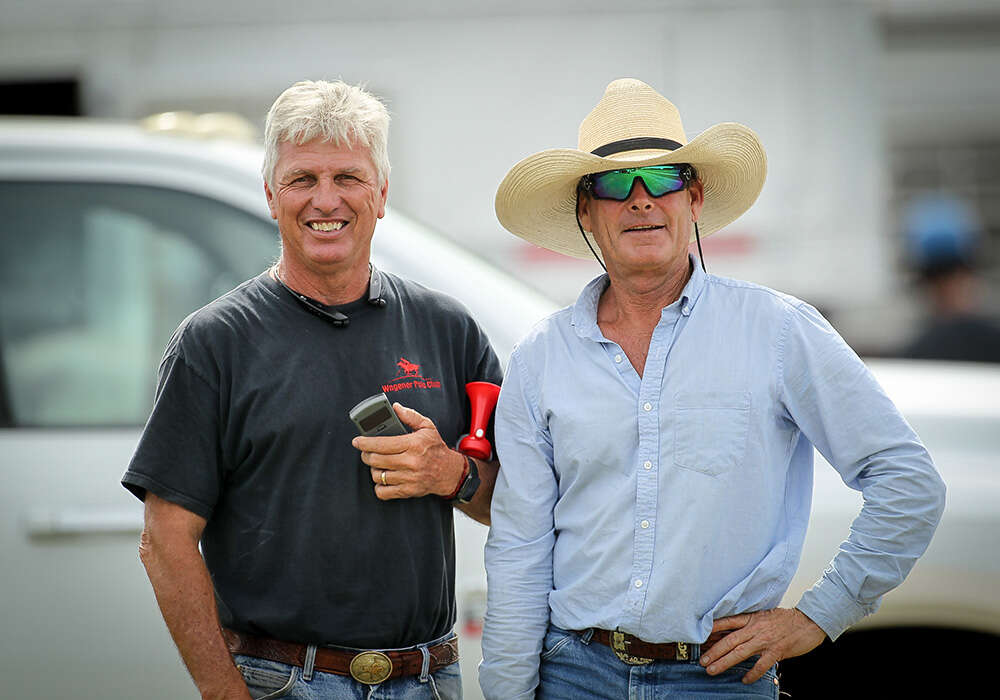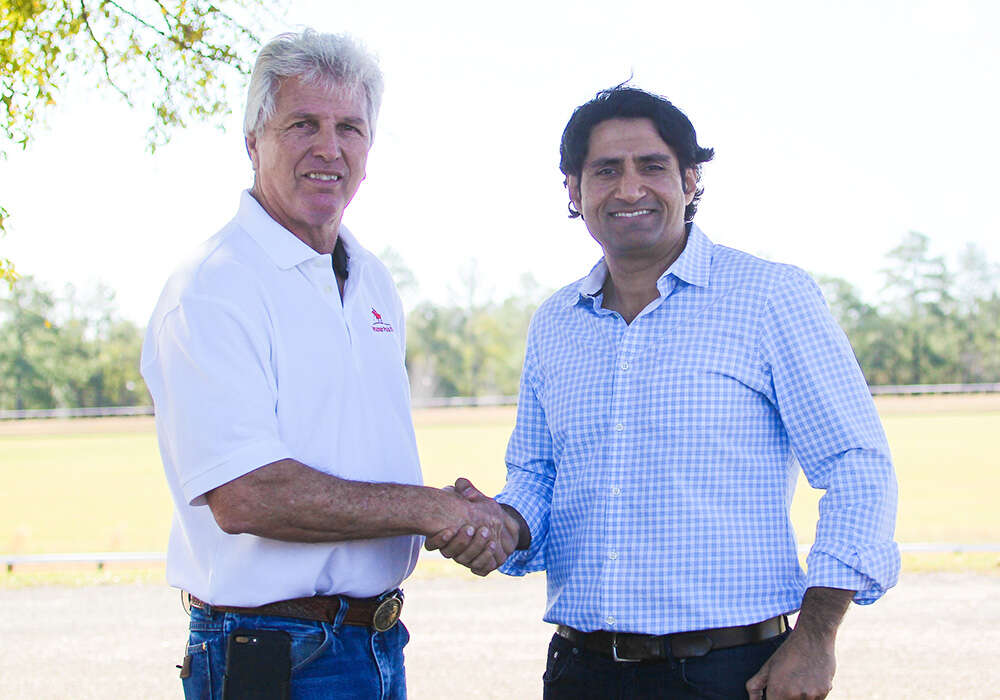Overcoming a childhood fear of riding horses to occasionally mounting rodeo bulls and broncos and galloping racehorses as a teenager, USPA Southeastern Circuit Governor Billy Raab never allows a challenge to derail his vision. Originally from Detroit, Michigan, Raab calls Wagener, South Carolina, home, where he lives and works on Broken Arrow Farm with his wife Michelle. The son of a single mother of three, Raab was instilled with the discipline of hard work from an early age, running the gamut of the polo industry as a 5-goal player, USPA Certified umpire, green horse trainer and polo club owner. Since stepping up to voice his opinion as Circuit Governor in September 2018, Raab has tapped into his expertise and dedicated himself to being available, responsive and creating a greater sense of unification between the clubs which are both historical and regional pillars of the polo community.
Before settling down in his later years in South Carolina, Raab’s playing career took him across the United States, England, Argentina and the Dominican Republic. A lifelong baseball fan (especially of the New York Yankees and Detroit Tigers), Raab found longevity in polo, managing his own Wagener Polo Club for over a decade and previously Aiken Polo Club in Aiken, South Carolina. Receptive to advice even now with decades of experience invested into the sport, Raab believes that success is found through diligence and continuous learning. Now mentoring two grandsons (son-in-law Andreas Weisz) who are blazing their own path in polo, Christian (otherwise known as Chief Osceola, Florida State University’s mounted mascot) and Mackenzie Weisz, representative of the NYTS Florida region, Raab’s determination has indirectly trickled down to positively influence the up-and-coming generation.

What is your equestrian background and how did you become involved in polo?
“I started playing polo in 1968 at the Detroit Polo Club in Union Lake, Michigan. When I was in seventh grade I got into a fight with a boy named Russell Siders and we ended up becoming good friends. He was playing polo and working for John Magers at the time and since I lived next to a stick-and-ball field I started hotwalking horses. I wouldn’t get on one because I was scared, but finally I got tired of people calling me a chicken! I decided to jump on a horse and ended up going for a long two-and-a-half hour trail ride through the woods. I found out it wasn’t that bad and although I bounced around at first it just felt natural to me from the start and I was hooked. After that I wanted to ride anything I could and I didn’t care if it tried to buck me off because I didn’t think it could. I also tried jumping briefly, but found that it’s not my style because there is so much waiting around for only a 30-second thrill.
In 1974 Merle Jenkins gave me my first job grooming in Florida so I went to Boca Raton and I started playing practice games. Two years later I was hired by Ed Bernard and went to Alabama as a groom/player, working my way up gradually to reach a 5-goal handicap.
Growing up my family didn’t have anything to do with horses, my mother raised me and my two sisters by herself. She wanted me to be a professional baseball player and go to Florida to try out for the Detroit Tigers, but when I came down I pursued polo instead and have been doing it ever since.”
“As I was growing up people kept telling me that I’d never make it so when someone told me I couldn’t do something I was determined to. That’s why I always liked the challenge of getting the horse that was going to try and buck me off.” – Billy Raab
What do you enjoy the most about training green horses?
“I still actively train green horses and I’ve made over 30 throughout my career. The first horse I trained I sold to Bart Evans when I was 20 years old. I am completely self-taught and I always listened and paid attention, trying to learn everything I could from more experienced horsemen. I was lucky that many horse trainers and players including Joe Barry and Tommy Wayman talked to me and helped me out along the way.
It’s a great feeling knowing that I made horses that went on to play high-goal polo. I bought a 2-year old gelding named Awesome and called Sugar Erskine and said ‘this is one of the nicest horses I’ve ever had. I’ll make you a deal, you can buy him now for $20,000 or you can get him in a couple years for 50,000 plus, but if you buy him now you can’t have him until he’s ready.’ He bought the horse and a year and a half later played him in Boca Raton in the $100,000 Gold Cup game. The next day I called Sugar and said, ‘he’s ready for you.’ Sugar played Awesome in the U.S. Open Polo Championship® and then shipped him to Argentina to play in the Argentine Open.”
Why do you think low-goal polo is thriving in the Southeastern Circuit?
“Playing only four chukkers makes it more feasible for everybody and there are a lot more players at that level in this region, so I find it’s much easier to fund. Most of the people playing in these tournaments are from other states including Georgia, New York, Maryland, Virginia, Florida, and New Jersey. Many people who come here play in the spring and then they return to their home club in the summer and either come back in fall or turnout their horses. You can play here basically year-round; during the winter I play green chukkers at my farm, we have outdoor arenas that we can use. Right now, I go to Skaneateles Polo Club in Skaneateles, New York, in the summer and run the club for Marty Cregg, but I used to stay here and play through those months.
This past fall in Aiken we had ten teams in one tournament which we haven’t seen in 12 years so it’s definitely growing. Aiken Polo Club and Wagener Polo Club joined together to be more or less one singular club so we wouldn’t be drawing away from each other. There is still some overlapping of schedules, but the clubs try to work together to make it feasible for the pros and sponsors. As long as you are organized and treat everybody fairly you’ll get people to come play at your club.”

What is your opinion as a small club owner on how small clubs are an asset to the USPA?
“Low goal polo and club polo are essential to producing sponsors so that polo can grow. In anything you have to start at the bottom and work your way up to make it to the top. The USPA is trying harder to promote low-goal polo being played at small clubs across the country by introducing prize money for lower goal club tournaments which I think will help. Although we can climb the ladder of polo eventually with age we are going to come back down to low goal so that level of polo is going to last forever and sustain the sport.”
How has umpiring played an important role in your polo career?
“To help myself learn faster I started umpiring when I was younger because it forced me to pay close attention and really learn the game. I was in the umpire program until I left Florida 13 years ago and I did it for four to five years in South Carolina. The last time I umpired in Aiken was three years ago because my schedule became too busy. I still umpire from time to time in the summer in New York.”
When you umpire you are able to understand the game much better because you pay more attention to it rather than just playing. I encourage everyone to umpire, it’s not that easy but you have to really learn and understand the rules and thoroughly read the Rulebook. Knowing the Rulebook definitely helped my game because I tried to figure out how I could beat the rules which I used to my advantage. Umpiring trains you to focus on the game, the other players, and anticipate the plays before they happen. Most players just chase the ball around the field, but they don’t think about if their opponent is going to back the ball, turn it, hit it away, or where their teammates are on the field. Umpiring definitely helped my polo career and knowing the rules is definitely going to make anyone a better polo player.”
“My number one sport to this day is still baseball, but when you get to a certain age in baseball you’re done. In polo anybody can play at any age and because it’s you and the horse you have to be able to work together. I always tell people to never give up faith because if you want something badly enough you can do it.” – Billy Raab
What have you learned in your time as a club manager and what is your advice to other small club owners?
“I learned from watching other managers and seeing how they ran their clubs. I’m always paying attention to see if what someone else is doing can better me and help me down the road. Typically, I leave the house at 6:00am and return at 11:00pm seven days a week and my wife and I don’t have help, we do everything on the farm from mowing 57 acres of grass to feeding and exercising all the horses.
The main thing when running a small club is staying organized, starting your practices on time and making sure everybody has a good time by treating everyone fairly regardless of how much money they have or your personal relationship to them. As long as you are fair with everyone you’ll have people who want to follow you and continue to play at your club.”
If you would like to get in touch with Billy Raab about your club he can be reached at bkrpolo@aol.com.
